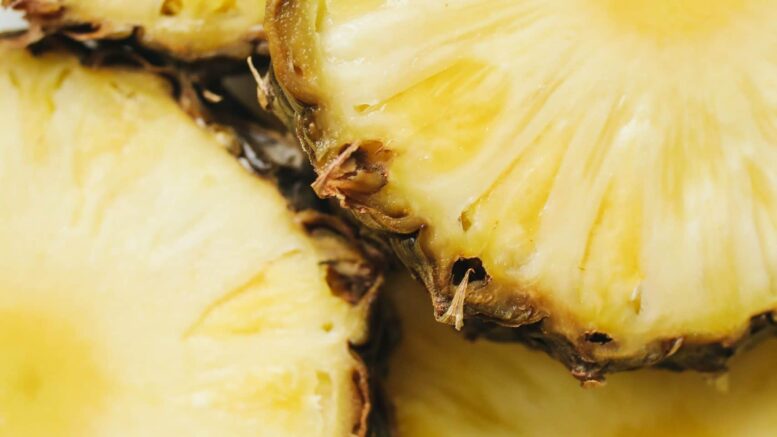Is pineapple good for diabetes?
Pineapple, also called Ananas in some parts of the world, is a tasty and juicy tropical fruit. It’s especially loved by sweet lovers.
History says it originates from Brazil and nowadays you can find it at any store since it’s the third most important tropical fruit in world production. Pineapple is also one of the few fruits with tons of beneficial nutrients.
With diabetes, it is necessary to adhere to healthy nutrition – a well-chosen diet is an important assistant in the fight against the disease and its complications.
Many food products are advised to be avoided for diabetics which makes it difficult to find diverse diabetic-friendly foods.
Is it ok to eat pineapples for those with diabetes, how to eat them correctly – these are common questions of concern for diabetics, and we will try to answer them.
To give you a straightforward answer, Pineapple is a safe and good fruit for diabetes, but there should be limitations in quantity and some other things taken into account, to avoid blood sugar spikes and long-term diabetic complications.
Pineapple is very low in protein and fat, but high in carbohydrates and sugars.
It contains vitamins A, B1, B2, B3, B6, B9, C, E, PP, macronutrients (calcium, magnesium, sodium, potassium, phosphorus), iron, copper.
Furthermore, pineapple contains a special plant enzyme called bromelain, which promotes the breakdown of fats and the absorption of proteins.
Let’s list all the factors we should be aware of about the pineapple
1. Glycemic index
Counting glycemic index is one of the most common methods used by diabetics to predict blood sugar levels after consuming certain foods.
Pineapple belongs to medium GI groups – with an index of 66. Which makes it a safe fruit only when consumed in small quantities per day. Otherwise, it can potentially be the cause of blood sugar spikes.
Although noteworthy to mention, GI of food is affected by some factors,
- Processed, canned, dried, or juiced pineapples will always have a higher GI
- The riper fruit is sweeter it will be
- Any fruit in juice form is considered to be sweeter than raw fruit
- Take home message is -it’s best to consume raw, fresh pineapple than any other form to minimize its impact on blood sugar levels.
2. Carbohydrates
For those who prefer to count carbs, pineapple contains 13 grams of carbohydrates per 100 grams of fruit, according to Dietary Guidelines for Americans recommended daily content of carbs should be 225-320 grams on average (although daily carbs are mostly determined by your body size and activity level).
The fact that pineapple is considered quite loaded with sugars, it’s not the best option for diabetics. It still has various beneficial nutrients which make it a healthy snack for those trying to manage blood sugar levels, only if several factors are taken into account and portion size is controlled.
Pineapple is full of antioxidants
It is a well-known fact that diabetics are considered to be a susceptible population when it comes to infections, the ongoing COVID-19 pandemic has highlighted that.
Antioxidants are inflammation, infection and cancer fighters that neutralize toxic free radicals in our organisms and strengthen our immune systems.
Various antioxidants are found in pineapples, like phenolics, flavonoids and ascorbic acid (vitamin C)
There is 47,8mg of Vitamin C per 100 grams of pineapple, which is almost as much as in citruses like orange(53 mg) Vitamin C helps to cope with viruses and bacteria, so its use will contribute to the treatment and prevention of colds.
What’s more interesting, there is a study conducted by Deakin University, demonstrating the positive impact daily consumption of vitamin C has on lowering blood sugar and lipid levels, potentially decreasing the rate of diabetic complications.
Special enzyme – Bromelain
Bromelain is a proteolytic enzyme
Bromelain is a magical proteolytic enzyme found in the core of pineapple in great quantities, it has quite a lot of benefits:
1) Promotes weight loss, as bromelain actively breaks down proteins, creating a fat-burning effect
2) Has anti-inflammatory, antibacterial, and antiviral effects
3) Prevents thrombus formation – benefits cardiovascular health
4) Is considered to be a diuretic
Plus pineapple is considered to be a diet-friendly fruit, since it has just 50 calories per 100 grams, although it might not aid you in weight loss, but can work as an alternative to avoid more unhealthy, processed snacks.
Great source of manganese
Pineapple is full of manganese, which is an essential trace element, mainly known for its benefits for bone health and osteoporosis prevention and treatment, although, besides that, studies are stating that low levels of manganese might be associated with a higher prevalence of diabetes and renal disorders. https://pubmed.ncbi.nlm.nih.gov/
According to Pubmed study Levels of manganese (15–22 ppm) in normal pineapple, juices were found to be consistently much higher than those of Cr, Fe, Ni or Cu and much higher than in other common fruit juices.
Pineapple and diabetes go well when the fruit is fresh and raw.
Fresh fruits have lower calorie content and an acceptable GI. Canned or dried pineapple is not recommended for diabetics, as it contains a lot of sugar and very few nutrients and healing substances.
Pure pineapple in pieces or as juice will be the most beneficial for the body.
Recommendations
- Candied canned and dried fruits contain a lot of sugar, so they should be consumed in small quantities. Pineapple juice is quite sugary, so make sure to go for raw pineapple
- Consuming Protein or low-fat food with pineapple is considered to slow blood sugar spikes.
- Moderation is the key! Know your limits, try to control your portions
- After a meal, the glucose level should be monitored; if it rises sharply, it is necessary to stop eating the fruit.
- Pineapple is a strong allergen so avoid it in case of a history of allergies
References:
https://nutritiondata.self.com/facts/
https://en.wikipedia.org/wiki/Pineapple
https://www.nutritionvalue.org/
https://pubmed.ncbi.nlm.nih.gov/
https://diabetesnsw.com.au/news/
See Also

As a nutritionist, I research, find and experiment with recipes, natural diets and meal plans for weight loss, bodybuilding, and detoxing.
